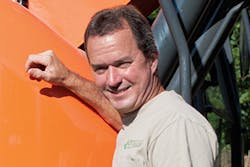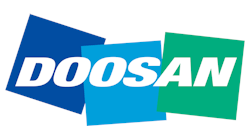What a difference purchasing a piece of compact equipment can make in taking a company in a new direction. Such is the case for Rich Johnston, who has been gradually transitioning his company, Johnston Landscape Maintenance, in Westville, IN, into more excavation work. His company had been doing typical landscape maintenance and projects, but purchasing his first mini excavator opened up more opportunities to do land clearing and stump removal. Johnston now provides services with a fleet that includes a John Deere 244J wheel loader, a Bobcat skid-steer loader 250, a Bobcat Toolcat, a Bobcat 430G series mini-excavator, attachments such as a hydraulic thumb, a 42-inch digging bucket, a 5-foot ditching bucket, a quick coupler, pick-up trucks, trailers, snow plows, stump grinders, and chippers. He continues to add more to his fleet, such as a Doosan DL250 3.5-yard front end wheel loader and 14-ton Doosan DX140LCR excavator, eyeing expansion into bidding government jobs. Depending on the season, Johnston employs between five and 12 people and provides services—70% commercial and 30% residential—within a 60-mile radius from Valparaiso. All excavation work is done for the commercial sector and may include work on bank repossession properties, water lines, drain tiles, retention ponds, foundations, basements, driveways, entrances, culvert pipes, and parking lots.
What He Does Day to Day
A typical day generally runs from 8 a.m.–6 p.m. and can include any one of the company’s many services. A day runs longer if equipment needs repairing; downtime is lost revenue. Lately, Johnston’s crews have been “pulling up dead ash trees like crazy” in response to the region’s emerald ash borerinfestation.
What Led Him Into This Line of Work
For 11 years, Johnston sat in a corner office of US Steel’s Gary, IN, human resources department. “It was a nice job,” he notes. “I helped instigate some changes with inventory training and some programs involving heavy equipment, mobile equipment, and mechanics. But I never felt that I was really doing anything.” Johnston loved heavy equipment. For four years, he did some outside work while maintaining his white collar job. In 2005, having built up sufficient clientele in his landscaping side business, he left the Fortune 100 company to start his own company with wife Sue as the accountant. “It was a leap of faith,” concedes Johnston, a father of five.
“I left a comfortable income with benefits. I wanted to do something else with my life.”
What He Likes Best About His Work
“At US Steel, I would do something and not really see the end results of what I was putting in. It’s really hard to see the changes you’re making in a big, big company,” says Johnston. “They’re there, but they’re very subtle. Now we go out every day, finish a job, look at a property, and can say we did that and it made a difference. It’s a really nice feeling. I also like the crew I work with. They’re all kind of goofballs, so it helps. We all get along well.”
Finding and retaining employees is Johnston’s greatest challenge. It’s stunted his company’s growth more than anything. “We have a big crew that could be bigger, but I’m fearful of putting out fires because somebody is messing up stuff,” he says. The workforce is limited. Potential employees seek pay rates that exceed their skill levels. “One of my crew leaders is the first person I’ve found who can fix anything from heavy to small equipment. Between the two of us, we can fix just about anything,” says Johnston. “It seems like everybody in the 18- to 30-year age bracket is too busy partying, can’t pass a drug test, wants to play video games all day, or isclueless on how to do something.” Johnston relies on word-of-mouth for potential hires. “There’s a crying need to get people with a real hands-on skill set who doesn’t mind working,” he adds. “Everybody wants to wear a white shirt and say look at me because I’m important. I did that for 11 years at US Steel, so I know that pompous feeling. It’s OK to work outside. It’s OK to work with your hands.”




